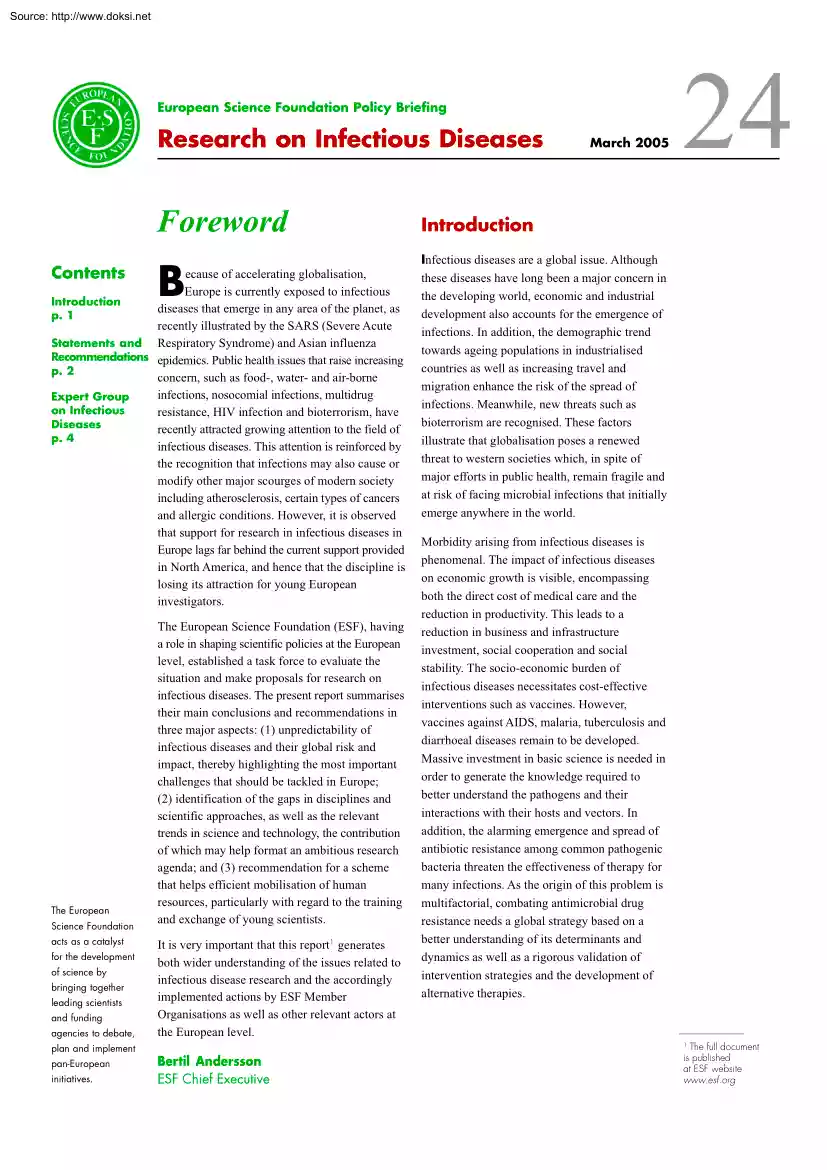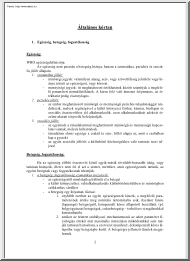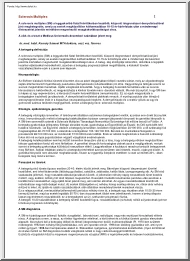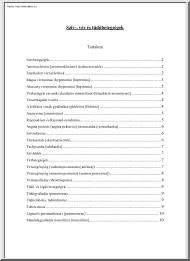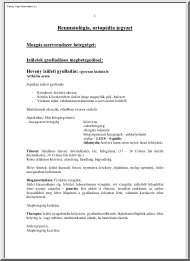Datasheet
Year, pagecount:2005, 4 page(s)
Language:English
Downloads:3
Uploaded:October 06, 2017
Size:663 KB
Institution:
-
Comments:
Attachment:-
Download in PDF:Please log in!
Comments
No comments yet. You can be the first!Most popular documents in this category
Content extract
Source: http://www.doksinet European Science Foundation Policy Briefing Research on Infectious Diseases Foreword Contents B ecause of accelerating globalisation, Europe is currently exposed to infectious Introduction diseases that emerge in any area of the planet, as p. 1 recently illustrated by the SARS (Severe Acute Statements and Respiratory Syndrome) and Asian influenza Recommendations epidemics. Public health issues that raise increasing p. 2 concern, such as food-, water- and air-borne infections, nosocomial infections, multidrug Expert Group on Infectious resistance, HIV infection and bioterrorism, have Diseases recently attracted growing attention to the field of p. 4 infectious diseases. This attention is reinforced by the recognition that infections may also cause or modify other major scourges of modern society including atherosclerosis, certain types of cancers and allergic conditions. However, it is observed that support for research in infectious diseases in Europe
lags far behind the current support provided in North America, and hence that the discipline is losing its attraction for young European investigators. The European Science Foundation acts as a catalyst for the development of science by bringing together leading scientists and funding agencies to debate, The European Science Foundation (ESF), having a role in shaping scientific policies at the European level, established a task force to evaluate the situation and make proposals for research on infectious diseases. The present report summarises their main conclusions and recommendations in three major aspects: (1) unpredictability of infectious diseases and their global risk and impact, thereby highlighting the most important challenges that should be tackled in Europe; (2) identification of the gaps in disciplines and scientific approaches, as well as the relevant trends in science and technology, the contribution of which may help format an ambitious research agenda; and (3)
recommendation for a scheme that helps efficient mobilisation of human resources, particularly with regard to the training and exchange of young scientists. It is very important that this report1 generates both wider understanding of the issues related to infectious disease research and the accordingly implemented actions by ESF Member Organisations as well as other relevant actors at the European level. plan and implement pan-European initiatives. Bertil Andersson ESF Chief Executive European Science Foundation Policy Briefing March 2005 24 Introduction Infectious diseases are a global issue. Although these diseases have long been a major concern in the developing world, economic and industrial development also accounts for the emergence of infections. In addition, the demographic trend towards ageing populations in industrialised countries as well as increasing travel and migration enhance the risk of the spread of infections. Meanwhile, new threats such as bioterrorism are
recognised. These factors illustrate that globalisation poses a renewed threat to western societies which, in spite of major efforts in public health, remain fragile and at risk of facing microbial infections that initially emerge anywhere in the world. Morbidity arising from infectious diseases is phenomenal. The impact of infectious diseases on economic growth is visible, encompassing both the direct cost of medical care and the reduction in productivity. This leads to a reduction in business and infrastructure investment, social cooperation and social stability. The socio-economic burden of infectious diseases necessitates cost-effective interventions such as vaccines. However, vaccines against AIDS, malaria, tuberculosis and diarrhoeal diseases remain to be developed. Massive investment in basic science is needed in order to generate the knowledge required to better understand the pathogens and their interactions with their hosts and vectors. In addition, the alarming emergence and
spread of antibiotic resistance among common pathogenic bacteria threaten the effectiveness of therapy for many infections. As the origin of this problem is multifactorial, combating antimicrobial drug resistance needs a global strategy based on a better understanding of its determinants and dynamics as well as a rigorous validation of intervention strategies and the development of alternative therapies. 1 The full document is published at ESF website www.esforg 1 Source: http://www.doksinet The current situation in Europe regarding microbiology and infectious diseases is characterised by both strengths and weaknesses. The strengths are dominated by a long tradition of research excellence and potent institutions with a significant research component in this field, as well as a large workforce of research experts and well-trained infectious disease clinical specialists. The weaknesses are essentially deficient private and public funding, lack of vision and long-term commitments,
fragmentation by disciplines and countries causing lack of visibility and loss of attractiveness of the research field. In addition, industrial research and development in the area of new antibiotics and vaccines are dramatically decreasing, particularly in Europe. State-of-the-art infectious disease research and gaps to be filled are exemplified in three areas: (1) molecular and cellular pathogenesis of infections including both infective agents and host; (2) microbial evolution, molecular diagnostics and molecular epidemiology; and (3) antimicrobial resistance. There is a growing public awareness of the issue of infectious diseases, with particular interest in issues such as emerging/re-emerging infections (AIDS, SARS, tuberculosis), nosocomial infections and multiresistance of microorganisms, bioterrorism and the health status of the developing world. There is also an increasing awareness on the part of European authorities of a need for action2. However, a coherent European policy
in the prevention and control of infectious diseases needs to be backed up by a strong basic research component, and thus, the need to encourage basic research in microbiology and infectious diseases. Statements and recommendations European science must play a major role in the fight against infectious diseases, particularly through the establishment of a stronger and more coherent surveillance and control system and through a substantially increased investment in basic microbiological research to underpin this endeavour. Only with such an investment will Europe be able to manage infectious diseases within its own boundaries. In addition, Europe will also be able to help in preventing the emergence and spread of infections prevailing elsewhere on the globe3. 1. Infectious diseases are unpredictable The sense of a need for readiness appears clearly with regard to the urgency of public health measures. A similar sense of urgency regarding the basic knowledge of pathogen biology,
microbial immune evasion and host immune responses does not exist. The ESF urges the relevant authorities to recognise that basic research in the fields of microbiology and cellular biology (microbial interface biology) may represent the best guarantee of preparedness for the next infectious diseases alert. 2. Basic studies in microbial interface biology represent excellent paradigms of integrated approaches to study complex biological processes. Strong, creative, cutting-edge basic research is the only guarantee of generating the original breakthroughs that will lead to inventions and innovation in diagnostics, treatment and vaccine prevention. The ESF recommends that the following areas of research should be strengthened: . . . . . European Science Foundation Policy Briefing basic microbiology in the broadest sense molecular and cellular mechanisms of microbial host cell and tissue interactions pathogens, their environments and their vectors, and the mechanisms of species barrier
crossing host immune responses to pathogens and genetic basis of human susceptibility to specific pathogens integrated molecular epidemiology and evolutionary genomics of microbial pathogens determinants of antimicrobial resistance and assessment of containment strategies. WHO 2004 report on “Priority Medicines for Europe and the World”. http://www.whoint/ mediacentre/news/releases /2004/pr83/en/ 2 This unprecedented effort is intended to back up at the fundamental level, the action of the European Centre for Disease Prevention and Control (ECDC) created in Stockholm in May 2005. 3 2 Source: http://www.doksinet In addition, the ESF recommends that coherence in research programs should be attained through networking at the European level. 3. Medicine as a whole has benefited greatly from fundamental research. However, the potential gain in clinical practice for infectious diseases from the rapid advances in basic knowledge and techniques has not been investigated adequately.
The ESF recognises that translational research is the key to realising these potential benefits and that it has already exerted an impact on the daily practice of clinicians in many other areas. Therefore, the ESF recommends that translational research in infectious diseases should be prioritised urgently. 4. In the absence of strong European encouragement, the discipline will lose its attractiveness and impact, resulting in the consecutive loss of talented young scientists. The ESF recommends that the visibility of microbiology and infectious diseases should be improved, particularly for young scientists at the stages at which they need to make strategic career choices. The ESF suggests that possible components of a European action may include: . . . . training for graduate students training for post-doctoral scientists funding of transdisciplinary research programmes organisation of training courses and workshops organisation of networks and common data banks. 5. As one of the
dominant problems in the infectious diseases arena, the increasing antimicrobial resistance is a concern already regarded as extremely serious. At the same time, the pharmaceutical industry has dramatically reduced its commitment to antibacterial R&D. The ESF recommends that public support for the development of anti-infective drugs should be increased significantly, and the involvement of industry in the relevant research areas should be encouraged. European Science Foundation Policy Briefing 3 Source: http://www.doksinet Expert Group on Infectious Diseases . . . . . . . . Philippe Sansonetti (Chair), Inserm U 389, Unité de Pathogénie microbienne moléculaire, Institut Pasteur, Paris, France Ernst Theodor Rietschel (Vice-Chair), Abteilung Immunchemie und Biochemische Mikrobiologie, Forschungszentrum Borstel, Borstel, Germany Murat Akova, Department of Infectious Diseases, School of Medicine, Hacettepe University, Ankara, Turkey Richard M. Elliott, Institute of Virology,
University of Glasgow, Glasgow, United Kingdom Nina Langeland, Department of Medicine, Haukeland University Hospital, Bergen, Norway Gabor Palos, Semmelweis University, IIIrd Department of Medicine, Budapest, Hungary Antoni Trilla, Assessment, Prevention and Support Unit (UASP), Hospital Clinic, University of Barcelona, Barcelona, Spain Jos W.M van der Meer, Dept Internal Medicine, University Medical Centre StRadboud, Nijmegen, The Netherlands ESF Standing Committee – European Medical Research Councils (EMRC) Chair: . . . Clemens Sorg, University of Münster, Germany ESF EMRC Staff: Marianne Minkowski Head of Unit (until June 2004) Carole Moquin-Pattey Head of Unit (since January 2005) Hui Wang (Editor) European Science Foundation Policy Briefings are published by the European Science IREG Strasbourg - Dépôt légal: mars 2005 - N° d’ordre: 050848 Foundation (ESF). They address selected science policy issues of key concern to the Foundation’s Member Organisations and the
wider scientific community. By drawing on the advice and expertise of the ESF’s membership, the briefings aim both to provide information and to promote discussion. Further information on the ESF’s scientific and science policy activities is available from the Communication and Information Unit, European Science Foundation 1 quai Lezay-Marnésia, BP 90015 67080 Strasbourg cedex, France Tel: +33 (0)3 88 76 71 25 Fax: +33 (0)3 88 37 05 32 Email: communications@esf.org www.esforg ISRN ESF-SPB-05-24-FR+ENG European Science Foundation European Science Foundation Policy Briefing 4
lags far behind the current support provided in North America, and hence that the discipline is losing its attraction for young European investigators. The European Science Foundation acts as a catalyst for the development of science by bringing together leading scientists and funding agencies to debate, The European Science Foundation (ESF), having a role in shaping scientific policies at the European level, established a task force to evaluate the situation and make proposals for research on infectious diseases. The present report summarises their main conclusions and recommendations in three major aspects: (1) unpredictability of infectious diseases and their global risk and impact, thereby highlighting the most important challenges that should be tackled in Europe; (2) identification of the gaps in disciplines and scientific approaches, as well as the relevant trends in science and technology, the contribution of which may help format an ambitious research agenda; and (3)
recommendation for a scheme that helps efficient mobilisation of human resources, particularly with regard to the training and exchange of young scientists. It is very important that this report1 generates both wider understanding of the issues related to infectious disease research and the accordingly implemented actions by ESF Member Organisations as well as other relevant actors at the European level. plan and implement pan-European initiatives. Bertil Andersson ESF Chief Executive European Science Foundation Policy Briefing March 2005 24 Introduction Infectious diseases are a global issue. Although these diseases have long been a major concern in the developing world, economic and industrial development also accounts for the emergence of infections. In addition, the demographic trend towards ageing populations in industrialised countries as well as increasing travel and migration enhance the risk of the spread of infections. Meanwhile, new threats such as bioterrorism are
recognised. These factors illustrate that globalisation poses a renewed threat to western societies which, in spite of major efforts in public health, remain fragile and at risk of facing microbial infections that initially emerge anywhere in the world. Morbidity arising from infectious diseases is phenomenal. The impact of infectious diseases on economic growth is visible, encompassing both the direct cost of medical care and the reduction in productivity. This leads to a reduction in business and infrastructure investment, social cooperation and social stability. The socio-economic burden of infectious diseases necessitates cost-effective interventions such as vaccines. However, vaccines against AIDS, malaria, tuberculosis and diarrhoeal diseases remain to be developed. Massive investment in basic science is needed in order to generate the knowledge required to better understand the pathogens and their interactions with their hosts and vectors. In addition, the alarming emergence and
spread of antibiotic resistance among common pathogenic bacteria threaten the effectiveness of therapy for many infections. As the origin of this problem is multifactorial, combating antimicrobial drug resistance needs a global strategy based on a better understanding of its determinants and dynamics as well as a rigorous validation of intervention strategies and the development of alternative therapies. 1 The full document is published at ESF website www.esforg 1 Source: http://www.doksinet The current situation in Europe regarding microbiology and infectious diseases is characterised by both strengths and weaknesses. The strengths are dominated by a long tradition of research excellence and potent institutions with a significant research component in this field, as well as a large workforce of research experts and well-trained infectious disease clinical specialists. The weaknesses are essentially deficient private and public funding, lack of vision and long-term commitments,
fragmentation by disciplines and countries causing lack of visibility and loss of attractiveness of the research field. In addition, industrial research and development in the area of new antibiotics and vaccines are dramatically decreasing, particularly in Europe. State-of-the-art infectious disease research and gaps to be filled are exemplified in three areas: (1) molecular and cellular pathogenesis of infections including both infective agents and host; (2) microbial evolution, molecular diagnostics and molecular epidemiology; and (3) antimicrobial resistance. There is a growing public awareness of the issue of infectious diseases, with particular interest in issues such as emerging/re-emerging infections (AIDS, SARS, tuberculosis), nosocomial infections and multiresistance of microorganisms, bioterrorism and the health status of the developing world. There is also an increasing awareness on the part of European authorities of a need for action2. However, a coherent European policy
in the prevention and control of infectious diseases needs to be backed up by a strong basic research component, and thus, the need to encourage basic research in microbiology and infectious diseases. Statements and recommendations European science must play a major role in the fight against infectious diseases, particularly through the establishment of a stronger and more coherent surveillance and control system and through a substantially increased investment in basic microbiological research to underpin this endeavour. Only with such an investment will Europe be able to manage infectious diseases within its own boundaries. In addition, Europe will also be able to help in preventing the emergence and spread of infections prevailing elsewhere on the globe3. 1. Infectious diseases are unpredictable The sense of a need for readiness appears clearly with regard to the urgency of public health measures. A similar sense of urgency regarding the basic knowledge of pathogen biology,
microbial immune evasion and host immune responses does not exist. The ESF urges the relevant authorities to recognise that basic research in the fields of microbiology and cellular biology (microbial interface biology) may represent the best guarantee of preparedness for the next infectious diseases alert. 2. Basic studies in microbial interface biology represent excellent paradigms of integrated approaches to study complex biological processes. Strong, creative, cutting-edge basic research is the only guarantee of generating the original breakthroughs that will lead to inventions and innovation in diagnostics, treatment and vaccine prevention. The ESF recommends that the following areas of research should be strengthened: . . . . . European Science Foundation Policy Briefing basic microbiology in the broadest sense molecular and cellular mechanisms of microbial host cell and tissue interactions pathogens, their environments and their vectors, and the mechanisms of species barrier
crossing host immune responses to pathogens and genetic basis of human susceptibility to specific pathogens integrated molecular epidemiology and evolutionary genomics of microbial pathogens determinants of antimicrobial resistance and assessment of containment strategies. WHO 2004 report on “Priority Medicines for Europe and the World”. http://www.whoint/ mediacentre/news/releases /2004/pr83/en/ 2 This unprecedented effort is intended to back up at the fundamental level, the action of the European Centre for Disease Prevention and Control (ECDC) created in Stockholm in May 2005. 3 2 Source: http://www.doksinet In addition, the ESF recommends that coherence in research programs should be attained through networking at the European level. 3. Medicine as a whole has benefited greatly from fundamental research. However, the potential gain in clinical practice for infectious diseases from the rapid advances in basic knowledge and techniques has not been investigated adequately.
The ESF recognises that translational research is the key to realising these potential benefits and that it has already exerted an impact on the daily practice of clinicians in many other areas. Therefore, the ESF recommends that translational research in infectious diseases should be prioritised urgently. 4. In the absence of strong European encouragement, the discipline will lose its attractiveness and impact, resulting in the consecutive loss of talented young scientists. The ESF recommends that the visibility of microbiology and infectious diseases should be improved, particularly for young scientists at the stages at which they need to make strategic career choices. The ESF suggests that possible components of a European action may include: . . . . training for graduate students training for post-doctoral scientists funding of transdisciplinary research programmes organisation of training courses and workshops organisation of networks and common data banks. 5. As one of the
dominant problems in the infectious diseases arena, the increasing antimicrobial resistance is a concern already regarded as extremely serious. At the same time, the pharmaceutical industry has dramatically reduced its commitment to antibacterial R&D. The ESF recommends that public support for the development of anti-infective drugs should be increased significantly, and the involvement of industry in the relevant research areas should be encouraged. European Science Foundation Policy Briefing 3 Source: http://www.doksinet Expert Group on Infectious Diseases . . . . . . . . Philippe Sansonetti (Chair), Inserm U 389, Unité de Pathogénie microbienne moléculaire, Institut Pasteur, Paris, France Ernst Theodor Rietschel (Vice-Chair), Abteilung Immunchemie und Biochemische Mikrobiologie, Forschungszentrum Borstel, Borstel, Germany Murat Akova, Department of Infectious Diseases, School of Medicine, Hacettepe University, Ankara, Turkey Richard M. Elliott, Institute of Virology,
University of Glasgow, Glasgow, United Kingdom Nina Langeland, Department of Medicine, Haukeland University Hospital, Bergen, Norway Gabor Palos, Semmelweis University, IIIrd Department of Medicine, Budapest, Hungary Antoni Trilla, Assessment, Prevention and Support Unit (UASP), Hospital Clinic, University of Barcelona, Barcelona, Spain Jos W.M van der Meer, Dept Internal Medicine, University Medical Centre StRadboud, Nijmegen, The Netherlands ESF Standing Committee – European Medical Research Councils (EMRC) Chair: . . . Clemens Sorg, University of Münster, Germany ESF EMRC Staff: Marianne Minkowski Head of Unit (until June 2004) Carole Moquin-Pattey Head of Unit (since January 2005) Hui Wang (Editor) European Science Foundation Policy Briefings are published by the European Science IREG Strasbourg - Dépôt légal: mars 2005 - N° d’ordre: 050848 Foundation (ESF). They address selected science policy issues of key concern to the Foundation’s Member Organisations and the
wider scientific community. By drawing on the advice and expertise of the ESF’s membership, the briefings aim both to provide information and to promote discussion. Further information on the ESF’s scientific and science policy activities is available from the Communication and Information Unit, European Science Foundation 1 quai Lezay-Marnésia, BP 90015 67080 Strasbourg cedex, France Tel: +33 (0)3 88 76 71 25 Fax: +33 (0)3 88 37 05 32 Email: communications@esf.org www.esforg ISRN ESF-SPB-05-24-FR+ENG European Science Foundation European Science Foundation Policy Briefing 4
